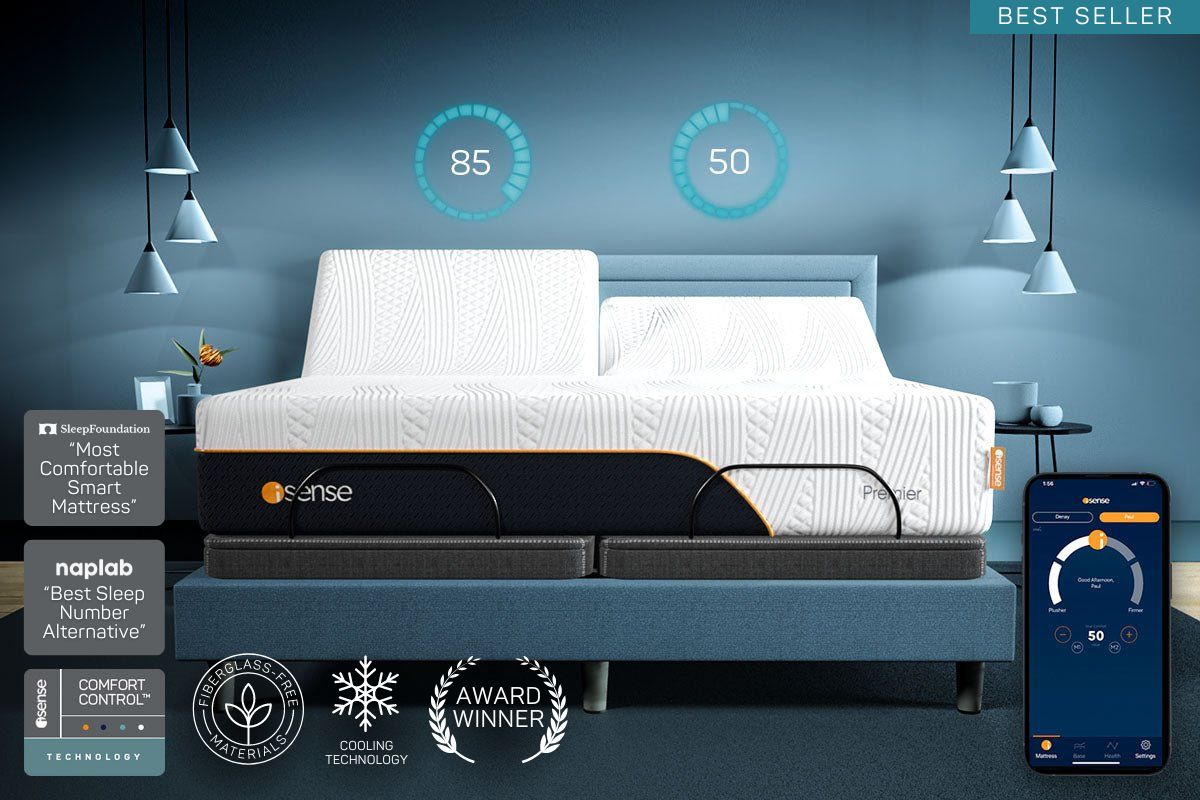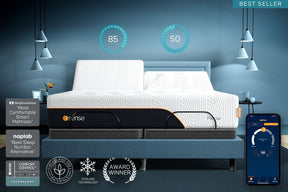Drowning in options while hunting for the perfect mattress? You're not alone, as many people struggle to find the right fit for their unique sleep needs. Our ultimate guide will help you navigate through various types of mattresses and factors such as firmness, size, material and more.
Ready to unlock your best night's sleep? Let's dive right in!
Understanding Your Sleep Needs
Assess your sleeping position, body type, and any pain or discomfort to determine the best mattress for your specific needs.
How to Assess Your Sleeping Position
First, think about how you sleep. Most people sleep on their sides, backs or bellies. Side sleepers often feel pressure on their shoulders and hips. Back sleepers might have back pain.
Stomach sleepers may get neck aches from turning their heads to one side. Getting this sorted out helps in mattress selection for your comfort.
Considering Body Type and Weight
Your body type and weight play big roles in picking the right mattress. Each body shape pushes down on a different place on the mattress. This is what we call pressure points. A good mattress will support your body at these points. An iSense mattress relieves pressure at all comfort settings, whether soft or firm.
Addressing Pain and Discomfort
Sleeping on the right mattress can help you feel better. If your bed is hard, it could be causing back pain. A soft mattress supports your body and eases pain. It keeps your spine straight while you sleep. This means no more aches when you wake up! For people who have arthritis, finding a cozy place to rest might seem tough. But choosing a mattress that fits your needs can make sleep enjoyable again.
Can't decide? Try looking for mattresses made for arthritis relief or ones built to prevent back pain before picking; they're designed just for this! The aim: improve your sleep quality with the perfect balance of comfort and support tailored to your preference.
Different Types of Mattresses
The different types of mattresses include memory foam, latex, innerspring, hybrid, and adjustable air.
Memory Foam
Memory foam is a popular material used in mattresses. It is known for its ability to contour to your body and provide excellent pressure relief. There are different types of memory foam, each with its own unique properties and benefits.
Memory foam mattresses often cost more than basic polyfoam models, but they are worth the investment if you value comfort and support while you sleep. They can also help reduce motion transfer, making them a great choice for couples or anyone who shares a bed.
Overall, memory foam mattresses offer a comfortable and supportive sleeping surface that can improve your sleep quality significantly.
Latex
Latex mattresses are a popular choice for those looking for a combination of comfort and support. They offer a unique blend of conforming to your body while still having some bounce.
This means that you can sink into the mattress just enough to feel supported, but also enjoy a bit of responsiveness.
One great thing about latex mattresses is their ability to isolate motion. This makes them an excellent option for couples or anyone who shares a bed with someone else. You won't be disturbed by your partner's movements during the night.
Contrary to common belief, latex mattresses come in different levels of firmness. So whether you prefer something softer or firmer, there is likely a latex mattress out there that will suit your preferences.
Additionally, latex is known for its durability, making it an ideal choice for heavier individuals or those who spend more time in bed.
Innerspring
Traditional innerspring mattresses are a popular choice for many people because they offer good support and breathability. Unlike all-foam mattresses, innerspring beds allow air to circulate more freely, keeping you cool while you sleep.
These mattresses have coils inside that provide a supportive feel and help distribute your body weight evenly. The top layer of an innerspring mattress is usually quilted, giving it a smooth and comfortable surface. You need a box spring to accompany this kind of mattress to stay comfortable and to help it last longer.
Whether you sleep on your back, side, or stomach, an innerspring mattress can adapt to your sleeping habits. So if you're looking for a versatile mattress that offers support and breathability, an innerspring mattress might be the right choice for you.
Hybrid
Hybrid mattresses are a combination of different materials, like foam and coils. They're designed to give you the best of both worlds - the comfort and contouring of foam, along with the support and bounce of coils. These mattresses often have layers of memory foam or latex on top, which can help relieve pressure points and provide a comfortable sleeping surface. The coil support core underneath adds durability and responsiveness.
So if you want a mattress that offers both support and comfort, a hybrid mattress might be just what you're looking for!
The iSense Hybrid Premier and the iSene Select mattresses feature a cooling top layer made with the most open-cell, breathable foam on the market.
Adjustable Air
Adjustable air mattresses are a type of mattress that allows you to customize the firmness and support according to your needs. Unlike regular air mattresses, adjustable air mattresses have air-filled chambers that can be adjusted to create an individualized sleep surface. This means you can personalize your comfort settings by adjusting the amount of air in each chamber. For couples with different preferences in mattress firmness, this feature can be especially beneficial.
iSense offers two adjustable mattresses, the iSense Classic and the iSense Hybrid Premier. Unlike other adjustable air mattresses which feature one large air chamber topped with foam, iSense mattresses feature fourteen small air chambers nestled within the seven foam layers.
Factors to Consider When Choosing a Mattress
Consider the firmness, comfort layers, support cores, thickness and density of the mattress, as well as your budget.
Firmness
Choosing the right firmness for your mattress is an important factor to consider when shopping. The level of firmness can impact your comfort and support while you sleep. It's essential to find a balance that suits your needs.
Keep in mind that everyone's preference may vary, so there isn't one "right" level of firmness for everyone. Factors like sleeping position, body type, and weight distribution can play a role in determining the ideal firmness for you.
Additionally, it's good to know that mattresses tend to soften over time, so choosing a slightly firmer mattress initially might be beneficial in the long run. Take all these factors into account when deciding on the perfect level of firmness for a good night's sleep.
Comfort Layers
Comfort layers are an important factor to consider when choosing a mattress. They provide cushioning and pressure relief, making your sleep experience more comfortable. The firmness level, material, sleeping position, body type, and budget all come into play when selecting the right comfort layers for you. Some people prefer softer mattresses with thicker comfort layers for added softness, while others prefer firmer models. Comfort layers can also help with back pain by offering proper support and alignment for your spine.
So when looking for the perfect mattress, don't forget to pay attention to the comfort layers that will contribute to a better night's sleep.
Support Cores
Support cores are an important factor to consider when choosing a mattress. The support core of a mattress contributes to its overall comfort and support. There are different types of materials that can be used for the support core, such as foam or innerspring coils.
If you have a higher body weight, you may need a firmer support core to ensure adequate support while sleeping. Hybrid mattresses, which combine supportive innerspring coils with comfortable layers, can be a good option for those who need added support.
So when choosing your mattress, don't forget to pay attention to the type of support core it has!
Thickness and Density
When choosing a mattress, it's important to consider the thickness and density. Thicker mattresses can have a big impact on how comfortable and supportive your sleep experience is.
They often provide better cushioning and pressure relief, giving you a more restful night's sleep. Additionally, the thickness of a mattress can also affect its durability and lifespan. Thicker mattresses tend to be more durable and last longer than thinner ones. So, when shopping for a mattress, make sure to pay attention to its thickness and choose one that suits your comfort needs.
Density is another factor to consider when selecting a mattress. Density refers to how much material is packed into each cubic foot of the mattress. Higher-density mattresses are generally more supportive and can offer better pressure relief for those with pain or discomfort issues.
Lower-density mattresses, on the other hand, may feel softer but could wear out faster over time. When deciding on density, it's essential to find the right balance between supportiveness and comfort level for your body type and sleeping position.
Budget
The cost of a mattress can vary based on factors like materials, brand, and size. Foam mattresses are usually more affordable than hybrid or latex ones. However, cheaper options may not offer the desired comfort and support.
It's important to compare prices and features to find the best value for your budget. Consider balancing affordability with quality and durability when making your choice.
Tips for Buying the Right Mattress
Consult experts, read reviews and comparisons, consider trial periods and warranties, care for your mattress, and make an informed decision to find the perfect mattress for your sleep needs.
Consulting with Experts
If you're looking to buy the right mattress for your sleep needs, it's a good idea to consult with experts. They can provide valuable guidance and help you find the perfect bed based on your specific requirements. Experts have extensive knowledge about different types of mattresses, their benefits, and drawbacks. They can assess factors like sleep position, body weight, and any pain or discomfort you may experience while sleeping.
By consulting with them, you can make an informed decision and choose a mattress that will give you the best comfort and support for a good night's sleep, and discover how often should you rotate your mattress.
Reading Reviews and Comparisons
To make sure you choose the right mattress for your needs, it's a good idea to read reviews and comparisons. This will give you valuable insights from other people who have already bought and tried different mattresses. Look for information about quality, durability, firmness, pressure relief, motion isolation, temperature regulation, warranty, size options, sleep position compatibility, and price range.
Consumer Reports has a helpful mattress buying guide that emphasizes the importance of comfort and support when choosing a mattress. Wirecutter also offers an in-depth guide with tips on how to find the perfect mattress for a more restful night's sleep.
Remember to ask specific questions and gather as much information as possible before making your final decision.
Additionally:
Reading reviews and comparisons can provide you with important information about different types of mattresses available in the market. This helps you understand which ones are more likely to meet your specific sleep needs.
Considering Trial Periods and Warranties
Online mattress companies often offer trial periods, allowing you to try out the mattress in your own home before making a final decision. This is especially beneficial since you can't test the mattress in person before purchasing.
Take advantage of these sleep trials, which can range from 30 to 120 days, to ensure that the mattress meets your needs and preferences. Additionally, make sure to understand the warranty offered by the company.
A good warranty will typically cover manufacturing defects and provide a guarantee for a certain period of time. Keep these considerations in mind when buying a mattress online to ensure that you have peace of mind and are satisfied with your purchase.
Caring for Your Mattress
Proper care of your mattress is essential to ensure its longevity and maintain a clean and healthy sleeping environment. Here are some tips for caring for your mattress:
- Rotate your mattress regularly: Rotating your mattress every 3-6 months can help prevent sagging and uneven wear. This distributes the weight evenly and extends the lifespan of your mattress.
- Use a mattress protector: Investing in a good quality, waterproof mattress protector helps protect against spills, stains, and dust mites. It also creates a barrier between you and the mattress, reducing the risk of allergens.
- Keep it clean: Vacuuming your mattress regularly helps remove dust and debris that may accumulate over time. You can also spot-clean stains using a mild detergent or stain remover, but make sure to follow the manufacturer's instructions.
- Avoid jumping on the bed: Although jumping on the bed may be tempting, it can cause damage to the springs or foam layers inside the mattress. This can lead to premature wear and decrease its overall comfort and support.
- Don't sit or stand on the edges: Sitting or standing on the edges of your mattress can strain the seams and weaken its structure. To avoid this, use proper seating arrangements for sitting purposes.
Final Thoughts
In conclusion, finding the perfect mattress for your sleep needs doesn't have to be overwhelming. By understanding your sleeping position, considering your body type and weight, and addressing any pain or discomfort you may have, you can narrow down your options.
Remember to explore different types of mattresses like memory foam, latex, innerspring, hybrid, and adjustable air to see which one suits you best. When choosing a mattress, factors like firmness level, comfort layers, support cores, thickness and density should all be taken into account.
Don't forget to consult with experts and read reviews before making a decision. Also consider trial periods and warranties offered by manufacturers. Taking care of your mattress will help extend its lifespan as well.
Conclusion
In conclusion, finding the perfect mattress for your sleep needs is essential for a comfortable and restful night's sleep. By understanding your sleeping position, considering factors like body type and weight, and addressing any pain or discomfort you may have, you can choose the right mattress.
Remember to assess factors such as firmness, comfort layers, support cores, thickness and density, and budget when making your decision. Consult with experts, read reviews and comparisons, consider trial periods and warranties, and take good care of your mattress to ensure it lasts.
With these tips in mind, you'll be on your way to achieving your best sleep ever!
FAQs
1. What are the different types of mattresses available?
The different types of mattresses include innerspring, memory foam, latex, hybrid, and adjustable air mattresses.
2. How do I know which mattress is right for me?
To find the perfect mattress for your sleep needs, consider factors such as your preferred level of firmness or softness, any specific health conditions or allergies you have, and your sleeping position.
3. Can a mattress affect my quality of sleep?
Yes, a mattress can greatly impact the quality of your sleep as it affects factors like comfort, support, and temperature regulation while you sleep.
4. What should I look for when testing out a mattress?
When testing out a mattress, pay attention to its comfort level based on how it feels when lying down or sitting on it. Also check if it provides adequate support to align your spine properly.
5. How often should I replace my mattress?
It is generally recommended to replace your mattress every 7-10 years or when you start experiencing discomfort or noticeable sagging that affects your sleep quality.






















